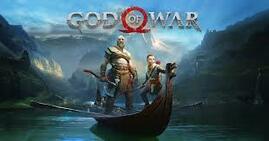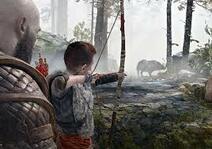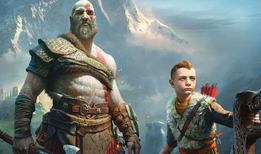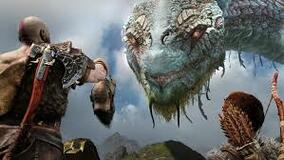 Spoiler Warnings for some stuff in God of War (2018). Well, as the title suggested, I love when a game’s story effects the way you fight. I call these narrative battle mechanics. In order to have strong narrative battle mechanics though, the game first has to have a strong narrative. The game must have a compelling beginning, middle, and end that captivates players and invests them in the characters’ journey. Unfortunately, this separates a lot of games from this particular niche mechanic despite some stellar and evocative battle mechanics. But not God of War! *Spoilers Ahead*  A little late to the party, but I just finished God of War, and like many others, it was my game of the year for 2018. That’s not to say it didn’t have it’s faults, it’s just that they seemed inconsequential for someone like me who is driven to play games because of great narratives. As far as that goes, the game was a ten out of ten on that end. From start to finish, I felt like an unstoppable raging god. Despite the RPG elements that curved your ability to take on later game challenges, I moved through the narrative without a worry that I could defeat any troll, ogre, or dragon I may encounter. With reliable and trustworthy Atreus at my side, I was the God of War...but as those who’ve played the game know, and hopefully you have because this is the last Spoiler Warning I can give, there’s a few hours in the game that Atreus ain’t as reliable as he once was. It’s annoying. You hammer the square button, and Mr. I’mma-god-so-I-don’t-give-a-what just does his own thing. He’s unresponsive and in a lot of cases dangerous to Kratos. The latter there may have just been me, but I’ll assume many players used Atreus like I did and mainly concentrated on his ability to stun enemies or knock them out of attack animations. During this point in the game, I took a lot of hits I wasn’t expecting. Getting the feel for the rhythm of attacks, I would be swiping at a few enemies in the front knowing full well that one would attack from behind shortly. When Atreus was a reliable little scamp, I would turn, hit square on the enemy, interrupting the enemy’s attack animation, and then enter into my own attack animation, killing the sucker.  But during the Punk Atreus section of the game, I would turn, hit square, and out of reflex, enter into my own attack animation which would be promptly disregarded by the smack down the enemy was launching at me. I could’ve dodged or blocked the attack, but I had developed a rhythm and Punk Atreus was a discordant note in the melody. As a result, not only did I watch the characters in the game get increasingly more annoyed with Atreus, I too felt annoyed. It was one thing to watch this can-do boy turn into a prick and how that affected Kratos, which I already empathized with to a certain degree, but it became a whole other thing to know that I, the player, was less effective because Atreus was going through his transformation. At first, I hated it. I hated Atreus for being a punk. I hated Kratos for not stepping up and telling Atreus what’s what. But hate and love are separated by a thin line in my eyes. And I eventually saw what this moment was and have since marked it as brilliant design and a strong narrative battle mechanic. By implementing this aspect, the developers brought the obstacles arising in the narrative into my home. It made me pause and reflect on the situation as a whole. It forced me to feel frustrated, sure, but also conflicted, confused, and even a little proud, as I believe Kratos was also feeling. Atreus was acting how Kratos acted. He embraced his father’s actions and the words and advice that had been drilled into him since the beginning of the game. Atreus became a mirror of Kratos. As much as those lessons Kratos had taught to Atreus had allowed him to survive the Greek Pantheon’s fall, he was also forced to see how negative and internally destructive his lessons had been. Although Kratos was trying to leave his past behind, because he had never truly changed, it now infected his son. Sure, those lessons helped Atreus become a better warrior, both in the narrative and in the mechanics, but they were a poison to the boy raised by the woman he loved.  I’m not really sure if I would or wouldn’t have got all of this without the battle mechanic. The cinematics and dialogue certainly detailed a lot of this, but because of the simple mechanic of making Atreus unresponsive to my commands, I felt absorbed into Kratos’s feelings. I felt more connected to the story. I was that much more invested in how to get Atreus to return to his regular self. Considering this, I think back on games like Final Fantasy XIII (I know, me bringing up a Final Fantasy game is like the sun rising, you know it’s going to happen). I believe a Zero Punctuation video noted that the character Hope was supposed to be this scared, helpless adolescent, narratively speaking; but in fights, if Hope was in your party, he was as bad ass and powerful as any other character who had earned their stripes as warriors. Hope was just an annoying nuisance during the narrative points in the game. I didn’t feel like I needed to protect him like Lightning or Snow had. I just felt like he needed to snap out of it and get on board. It removed me from empathizing with the characters and as result, made me feel less connected to the story as a whole. I can’t remember which Youtuber really brought this home for me, but I believe fight choreographer can be akin to great dialogue. Take the subway fight in The Matrix. Morpheus states something like, “he’s starting to believe,” and we see the fight ensue. Neo is unsure and scared, but as the fight presses, he gains a confidence and understanding of who he is and what he’s fighting against. No longer does Agent Smith clearly dominate. It’s something that could have been summated with a quick repartee, but because of the fight scene, we understood it through action. Typically this is something even I reserve for movies, but I don’t think that’s necessarily where it has to live, especially considering that in video games, we’re the driver of action. We can become that much more involved in the story because we are the ones moving through it, no matter who our protagonists are. So, as much as Punk Atreus is an annoying nuisance, I hope that looking back, we all remember that point in the game with fondness and love because of how it brought us closer to the narrative as a whole. I certainly have and I hope that it can be something to love for you too. What are your thoughts on narrative battle mechanics? Can you think of any other games that use this techniques as well as God of War? Let us know on our facebook page, or the comments below! P.S. Listeners of Hit Continue, the number one “gaming and variety” podcast on iTunes and Google Play, may know that Scott and I both agree that though FromSoftware's Bloodborne and Souls’ series has impeccable battle mechanics with a rich lore and world, the narrative of the game is pretty lacking. It’s there, I suppose, but it’s hidden and, therefore, non-essential and exempt from this kind of highlight. I bring this up just because I know that in today’s gaming vocabulary, you can’t bring up battle mechanics without someone mentioning Souls or Bloodborne. I won’t deny it. They’re pretty great. But in this case, kind of a non-starter.
0 Comments
Leave a Reply. |
Low Five's OpinionsWe have them. We share them. Hopefully, you enjoy them. Archives
November 2019
Categories |

 RSS Feed
RSS Feed
